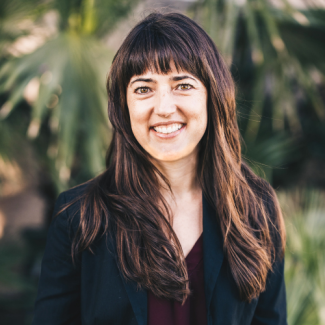
Joan Dudney is an Assistant Professor of Global Change Ecology at the Bren School and the Department of Environmental Studies at the University of California, Santa Barbara. Research in the Landscapes of Change (LOC) Lab is focused on understanding the causes and consequences of global change in terrestrial ecosystems. Joan’s current work seeks to disentangle the complex effects of climate change on forest communities, as well as the cascading impacts of changing disturbance regimes, including tree disease, bark beetles, and fire. She actively engages with and contributes to the fast-evolving literature on diversity, equity, inclusion and justice (DEIJ) in academic and research spaces. Joan will be joining the Bren School following a David H. Smith Postdoctoral Fellowship at UC Davis and an independent postdoctoral fellowship based at the National Center for Ecological Analysis and Synthesis (NCEAS). Joan received her bachelor's degree from Occidental College and volunteered for the Peace Corps in Paraguay, where she learned Spanish and the indigenous language, Guarani.
Research
Climate change is leading to unprecedented forest mortality and ecosystem shifts. We investigate the causes and consequences of these changes.
Predicting ecosystem transformations
Ecosystem transformations are occurring around the globe. At high elevations, alpine tundra is giving way to subalpine forests and at lower elevations, conifer forests are transforming into shrub-dominated systems. Where and how fast these transformations will occur under climate change remains poorly understood. Building off of a recent paper (winner of the ESA ECS Outstanding Paper Award), I am working with an interdisciplinary team of scientists to investigate threshold dynamics and tipping points in CA ecosystems.
Causal inference and climate change effects
How do we attribute a rise in temperature to a shift in ecological phenomena? Though experimental studies are the gold standard for linking a cause to an effect, climate change is acting across all scales of biological organization; further, there is no control treatment, which is fundamental for estimating an effect. New statistical tools, however, are enabling scientists to link causes and effects using observational data and counterfactual scenarios. Building off of an approach I used in a recent paper published in Nature Communications, I am leading a paper focused on climate change attribution in ecological settings.
Education
- Ph.D., University of California, Berkeley
- B.A., Occidental College
Courses Taught
- ENV S 193GC: Global Environmental Change - Impacts on Terrestrial Systems